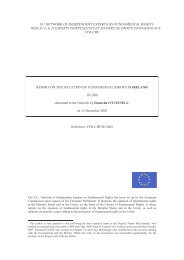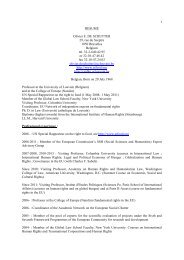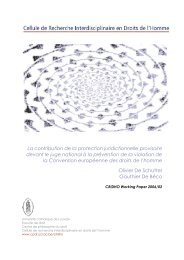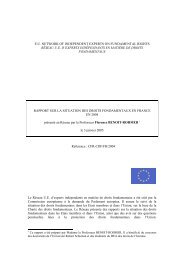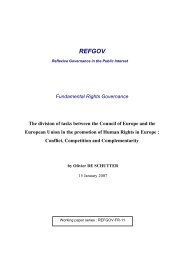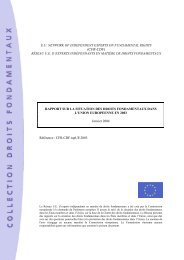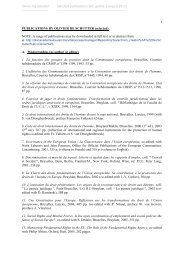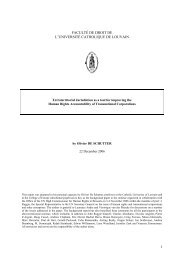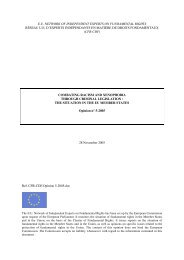The Prohibition of Discrimination under European Human ... - cridho
The Prohibition of Discrimination under European Human ... - cridho
The Prohibition of Discrimination under European Human ... - cridho
Create successful ePaper yourself
Turn your PDF publications into a flip-book with our unique Google optimized e-Paper software.
thematic report<br />
■ THE PROHIBITION OF DISCRIMINATION UNDER EUROPEAN HUMAN RIGHTS LAW ■<br />
In the progressive development <strong>of</strong> anti-discrimination law in Europe, there are reasons to believe that, despite the<br />
important influence traditionally exercised by the <strong>European</strong> Convention on <strong>Human</strong> Rights on fundamental rights<br />
in the legal order <strong>of</strong> the Union, the <strong>European</strong> Social Charter will become <strong>of</strong> rising importance. This is due, not only<br />
to the restricted scope <strong>of</strong> application <strong>of</strong> Article 14 ECHR – for which the entry into force <strong>of</strong> Protocol n°12 to the<br />
ECHR, due to the limited number <strong>of</strong> State ratifications it has for the moment attracted, will hardly compensate –,<br />
but also to the fact that, being presented with State reports which make it possible to follow on a regular basis the<br />
progress made in the realisation <strong>of</strong> the rights <strong>of</strong> the Charter and with collective complaints which target general<br />
legislations and policies and the effect they produce on groups, the <strong>European</strong> Committee on Social Rights may be<br />
better placed than the <strong>European</strong> Court <strong>of</strong> <strong>Human</strong> Rights to develop a jurisprudence on the need for an active<br />
labour policy aimed at the integration <strong>of</strong> target groups and, more generally, on the need for affirmative action – in<br />
the field <strong>of</strong> employment but also in the fields <strong>of</strong> education, housing, or social policy – directed towards the social<br />
and pr<strong>of</strong>essional integration <strong>of</strong> the most vulnerable segments <strong>of</strong> the population.<br />
<strong>The</strong> quasi absence <strong>of</strong> any case-law <strong>of</strong> the <strong>European</strong> Court <strong>of</strong> <strong>Human</strong> Rights deriving positive obligations from<br />
Article 14 ECHR and the timidity <strong>of</strong> the drafters <strong>of</strong> Protocol n°12 to the ECHR on the issue <strong>of</strong> positive action<br />
contrasts, as we have seen, with the insistence <strong>of</strong> the <strong>European</strong> Committee <strong>of</strong> Social Rights that legislation<br />
prohibiting discrimination actually produces effective integration, and with the requirement that the States<br />
parties monitor closely the impact their policies have on the situation <strong>of</strong> the most vulnerable groups. Combating<br />
discrimination requires more than prohibitions : it requires an active social and employment policy commensurate<br />
to the aim <strong>of</strong> realizing integration140 . It is this direction which recent evolutions within the <strong>European</strong> Social Charter<br />
point at. On the other hand, the case-law <strong>of</strong> the <strong>European</strong> Court <strong>of</strong> <strong>Human</strong> Rights <strong>under</strong> Article 14 ECHR may<br />
encourage an <strong>under</strong>standing <strong>of</strong> the prohibition <strong>of</strong> indirect discrimination on the grounds <strong>of</strong> race or ethnic origin<br />
which includes the requirement to take into account relevant differences between racial or ethnic groups, per<br />
analogy with the approach taken towards religion-based discrimination in the case <strong>of</strong> Thlimmenos.<br />
In sum, the reference to the jurisprudence <strong>of</strong> the <strong>European</strong> Social Charter and the <strong>European</strong> Convention on<br />
<strong>Human</strong> Rights could lead to move beyond the explicit definition <strong>of</strong> indirect discrimination <strong>under</strong> Articles 2(2)(b), <strong>of</strong><br />
the both the ‘Race’ and the Framework Directives. In the directives, indirect discrimination is defined only in<br />
reference to one <strong>of</strong> the three potential <strong>under</strong>standings <strong>of</strong> that concept distinguished in section 1.3. <strong>of</strong> Part I <strong>of</strong> this<br />
report : it is seen to occur where apparently neutral regulations, criteria or practices appear to be particular<br />
disadvantageous to the members <strong>of</strong> a certain category, if the provision creating the disadvantage is not<br />
objectively and reasonably justified (a). Neither disparate impact discrimination, as demonstrated by statistics (b),<br />
nor the failure to treat differently a specific individual or category by providing for an exception to the application<br />
<strong>of</strong> the general rule (c), are explicitly included in that definition. <strong>The</strong> jurisprudence <strong>of</strong> the <strong>European</strong> Committee <strong>of</strong><br />
Social Rights however strongly encourages the States to combat institutional discrimination by authorizing the<br />
statistical pro<strong>of</strong> <strong>of</strong> discrimination and by measuring the impact <strong>of</strong> the laws and policies they implement. And the<br />
Thlimmenos case-law <strong>of</strong> the <strong>European</strong> Court <strong>of</strong> <strong>Human</strong> Rights illustrates why, although the Framework Directive<br />
only mentions a requirement <strong>of</strong> reasonable accommodation with respect to persons with disabilities, the failure to<br />
take into account relevant differences could be seen as a form <strong>of</strong> indirect discrimination even though it may not<br />
be falling clearly within the definition <strong>of</strong> Article 2(2)(b) <strong>of</strong> the directives. With respect to religion, as shown in<br />
section 4 <strong>of</strong> Part III <strong>of</strong> this report, this could be a consequence <strong>of</strong> the freedom <strong>of</strong> religion guaranteed <strong>under</strong> Article<br />
9 ECHR, without it being necessary to rely on Article 14 ECHR.<br />
An examination <strong>of</strong> the case-law <strong>of</strong> the <strong>European</strong> Court <strong>of</strong> <strong>Human</strong> Rights relevant to the questions relating to the<br />
specific grounds envisaged in the directives leads to the following main results. In the context <strong>of</strong> the Framework<br />
Directive, the requirements deriving from Article 8 ECHR may have a decisive role to play in order to counter the<br />
140 C. McCrudden,“Institutional <strong>Discrimination</strong>”, Oxford J. Legal Studies, XXX.<br />
52



